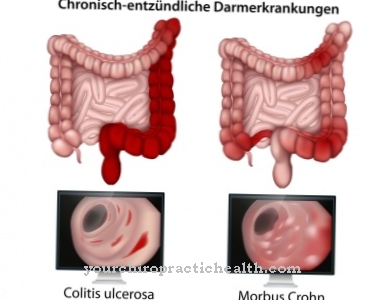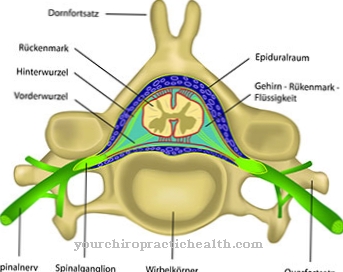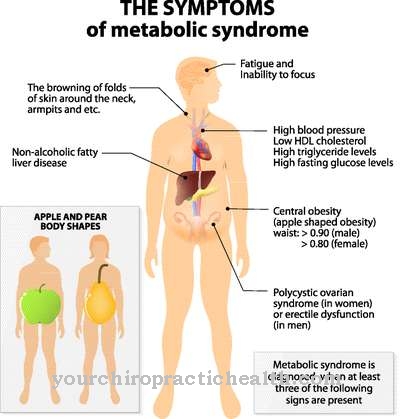A Mastoiditis is an inflammatory infectious disease of the mastoid process, which is the most common complication of otitis media acuta (acute otitis media) as a result of inadequate treatment. Mastoiditis can usually be treated well if therapy is started early.
What is mastoiditis?

As Mastoiditis is a bacterial inflammation of the mucous membrane in the air-containing cells of the mastoid process of the temporal bone. In most cases, mastoiditis is a sequela of acute otitis media (acute otitis media) that has not been completely cured. If mastoiditis in small children or infants is due to latent (hidden or undiscovered) otitis media, it is referred to as occult mastoiditis.
Mastoiditis manifests itself symptomatically through long-lasting fever in the acute stage of the disease, ear flow (otorrhea), tenderness over the mastoid process, retroauricular (behind the ear) swelling with protruding ear as well as restlessness, sleep disorders, loss of hunger and progressive (progressive) hearing loss.
If young children are affected by mastoiditis, they can also suffer from diarrhea and / or vomiting.
causes
Usually a Mastoiditis caused by a bacterial infection with pneumococci, streptococci, Haemophilus influenzae type B and in infants also with staphylococci. In some cases, the bacterial infection is preceded by a viral infection with rhinoviruses, influenza viruses, coxsackieviruses and adenoviruses, which cause colds and inflammations in the throat and can weaken the immune system.
As a result of the weakened immune system, the affected organism is more susceptible to bacterial pathogens. Bacteria invade the structures in the nasopharynx, from where they can get into the middle ear and cause otitis media. In the event of incorrect or non-treatment, the bacteria can colonize neighboring structures such as the air-containing bone cells of the mastoid process and cause mastoiditis.
Symptoms, ailments & signs
Mastoiditis can develop if an acute otitis media persists for more than two to three weeks. The disease is characterized by increasing earache, which is often associated with a decrease in hearing performance and unusual throbbing in the ear. In addition, there is a poor general condition or even a long-lasting fever with chills, vomiting and fatigue.
The swellings that usually develop behind the auricle and are filled with a light-colored tissue fluid are also typical of acute mastoiditis. The swollen area hurts when pressed or touched. In some patients, secretion drains from the ear as the disease progresses. The swelling also causes a misalignment of the ear. Especially in children, the auricle protrudes slightly and is reddened.
Long-term otitis media can lead to chronic mastoiditis, which is accompanied by other symptoms. This leads to loss of appetite, headaches, exhaustion and gastrointestinal complaints, but also chronic earache and a gradual decrease in hearing. Mastoiditis usually occurs over the course of several days or weeks and initially increases in intensity before the individual symptoms slowly subside.
Diagnosis & course
A Mastoiditis can be diagnosed by an otoscopy (otoscope), during which the external auditory canals and the eardrum are examined with an otoscope. A lowered back wall of the ear canal and a thickened, opaque eardrum, which may have a bulging and / or perforation (tear) with purulent ear secretion (ear flow), can indicate mastoiditis.
The diagnosis is confirmed by means of a Schüller temporal bone image (special X-ray image according to Schüller), which shows a shadowing of the mastoid cells (cells of the mastoid process or mastoid process) and a dissolution of the trabeculae. Computed tomography or magnetic resonance tomography allow statements to be made about the severity of the mastoiditis. An increased leukocyte count, an increased CRP value (C-reactive protein) and an increased sedimentation rate are inflammatory markers of the inflammatory reactions resulting from mastoiditis.
Conductive hearing loss can be determined in mastoiditis during a hearing test. With an early diagnosis and an early start of therapy, mastoiditis can usually be treated well and heals without consequences such as hearing loss.
Complications
Mastoiditis is itself a complication of otitis media. Without appropriate medical treatment, it can in turn have serious consequences. One of the most common complications of mastoiditis is the development of abscesses under the periosteum on the mastoid process. An abscess is an encapsulated collection of pus.
If the pus breaks into the side muscles of the neck and neck, doctors speak of a bezoid abscess. Abscess formation on the temporal lobes or in the cerebellum is also possible. Another consequence is cystomaticitis. This leads to an accumulation of pus below the zygomatic arch, which in turn is noticeable through pressure pain.
Other possible symptoms are restricted movement of the jaw, swelling and eyelid edema. If the pus penetrates into the pars petrosa of the temporal bone, there is a risk of symptoms such as headaches, damage to the cranial nerves and meningitis.
Furthermore, the pus can reach the parts of the sternocleidomastoid muscle (head nod). The result is a crooked posture of the neck towards the healthy side and its swelling on the diseased side, which causes pressure pain.
Complications can also arise if the pathogens spread, as they can reach other parts of the body via the bloodstream. There is a risk of sinus thrombosis, labyrinthitis (infection in the inner ear labyrinth), paralysis of the face (facial paresis) and life-threatening blood poisoning (sepsis).
When should you go to the doctor?
Since mastoiditis can lead to complete hearing loss, the disease should always be evaluated and treated by a doctor. There is no self-healing and, without treatment, the symptoms worsen. A doctor should be consulted in the case of mastoiditis if the person concerned suffers from severe ear pain that occurs for no particular reason and does not go away on its own. There can also be pain in the head or general weakness and generally poor wellbeing.
In some cases, a fever, vomiting, or chills also indicate the mastoiditis and should be evaluated by a doctor. The disease is noticeable in the ear as swelling, which can also lead to hearing loss. The quality of life of the person affected is considerably restricted and reduced by the disease. Not infrequently, loss of appetite or fatigue also indicate this complaint.Mastoiditis can be treated relatively well by a general practitioner or an ENT specialist. Early treatment increases the chances of complete healing.
Treatment & Therapy
A Mastoiditis is treated depending on the extent of the inflammation. In the presence of occult mastoiditis or a very early stage of the disease, nasal drops that have a decongestant effect and intravenous therapy with high-dose antibiotics in combination with paracentesis (incision of the eardrum) can be successful.
If the bony structures are involved or if there is no therapeutic success, the mastoiditis is usually treated surgically and with antibiotic therapy. For this purpose, the accumulations of pus and fluid (exudate) are drained off via an incision (cut) behind the auricle as part of a so-called mastoidectomy and the infected mastoid cells (cells of the mastoid process) are removed with the help of special burs.
In addition, a high-dose antibiotic is infused intravenously to kill the bacteria remaining in the organism. In some cases, fever reducers and pain relievers (paracetamol, ibuprofen) are used to reduce the often pronounced earache, which, however, should only be used for short periods in small children.
With regard to the success of antibiotic therapy in mastoiditis, as in other bacterial infectious diseases, it is crucial that the antibiotics are not discontinued too early in order to avoid resistance from the pathogen. If the pathogen can no longer be killed due to antibiotic resistance, serious complications such as sepsis (blood poisoning), meningitis (meningitis), a brain abscess or deafness can result from mastoiditis.
You can find your medication here
➔ Medicines for earache and inflammationOutlook & forecast
Mastoiditis has a favorable prognosis if the diagnosis is made early and therapy is started immediately. There is an inflammation of the mucous membrane that can be easily treated with today's medical options. The disease triggers are bacteria that die when medication is administered and are then transported away from the organism. The patient is usually discharged from treatment within a few weeks as having recovered.
If the disease is advanced or without medical care, the risk of complications is increased. Pain occurs, hearing impairment is present and locomotion disorders are possible. Since pus develops, life-threatening secondary diseases can develop in severe cases. Blood poisoning can develop, which must be treated by intensive care medicine, as otherwise the person affected will die prematurely. If the person concerned goes to medical care in good time, an operation will be carried out in these cases. This is associated with risks. If the procedure goes smoothly, medication is then given so that a full recovery is achieved.
In unfavorable conditions, the inflammation can spread. In addition, there is a possibility that the person affected will experience permanent impairment of hearing or even deafness.
prevention
One Mastoiditis cannot be prevented directly. Rather, colds, runny nose or otitis media should be prevented through a healthy, body's own defense system (healthy diet, lots of exercise) and adequate clothing in damp and cold weather conditions. In addition, the treatment of existing infectious diseases and inflammations in the area of the ears should not be stopped prematurely in order to prevent mastoiditis.
Aftercare
Since mastoiditis is easily treatable, follow-up care focuses on increasing a healthy lifestyle over the long term in order to avoid a weakening of the immune system. This includes sufficient exercise and a balanced diet with fresh ingredients. Yoga or Nordic walking are light sports that can be easily integrated into everyday life and can enormously increase well-being. If the expected symptoms arise after the treatment is completed, this should be clarified immediately with the attending physician.
You can do that yourself
If mastoiditis is suspected, a doctor should be consulted promptly. If the first signs such as earache or fever appear at night or on the weekend, mild symptoms can initially be treated with over-the-counter pain relievers. If the earache subsides overnight, there may only have been a temporary tube ventilation disorder. This is a limited or no pressure equalization between the middle ear and the nasopharynx. If the earache recurs as soon as the pain reliever wears off, this reinforces the suspicion of an otitis media, which should definitely be presented to the doctor.
Ear drops should not be given in this situation without a doctor's prescription. If the eardrum is still undamaged, the drops cannot reach the middle ear anyway. If the eardrum is already cracked, the drops can damage the inner ear. On the other hand, a heat treatment that promotes healing and has a pain relieving effect makes sense. A red light, a heating pad or a hot water bottle can be used for this. In naturopathy, placing hot potatoes wrapped in a towel is recommended. For the supportive treatment of acute mastoiditis, regular doses of chamomilla, aconite and belladonna in low potencies are used in homeopathy.
Purulent discharge from the ear should be removed regularly with an alcohol-soaked paper tissue or cotton pad. On the other hand, the ear canal must not be closed with cotton wool or other materials, as this could promote the multiplication of pathogens.


.jpg)
























